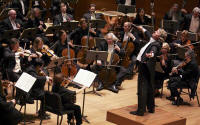 On
Thursday, March 12 at 8:00 PM at Alice Tully Hall, the American Classical
Orchestra, conducted by Maestro Thomas Crawford, presents Schubert’s Symphony
No. 9 ("Great"), Mozart’s "Coronation" Mass in C,
and
Beethoven’s Egmont Overture and Christ on the Mount of Olives (excerpt). Dan
Dutcher and Nicole Guberman spoke to Maestro Crawford about the upcoming
performance.
On
Thursday, March 12 at 8:00 PM at Alice Tully Hall, the American Classical
Orchestra, conducted by Maestro Thomas Crawford, presents Schubert’s Symphony
No. 9 ("Great"), Mozart’s "Coronation" Mass in C,
and
Beethoven’s Egmont Overture and Christ on the Mount of Olives (excerpt). Dan
Dutcher and Nicole Guberman spoke to Maestro Crawford about the upcoming
performance.
Dan Dutcher and Nicole Guberman: Can you tell us about your relationship with these great masterworks, and why you chose them?
Thomas Crawford: All four of the works are often-performed, popular classics of classical repertoire. Each season we do a program called "As the Masters Heard It," which is also our ACO tagline. This program features the orchestra itself, as opposed to guest artists for concerti or oratorios. In recent seasons, we have developed one of the finest choirs in New York as well, so for this year's "As the Masters Heard It" we add the choir to partner in a performance of the Coronation Mass and the well-known final chorus from Beethoven's Christ on the Mount of Olives oratorio. The Beethoven Egmont Overture is a personal favorite of mine because in a mere eight minutes it covers the range of emotions that we associate with the composer: anger, passion, tenderness, triumph. I programmed the Schubert Ninth because it is among the most virtuosic of all classical symphonies, taxing the greatest of orchestras.
DD & NG: How has the rehearsal process unfolded with your singers regarding this work (Mozart Coronation)? What has been the greatest challenge? What has been most rewarding?
TC: The challenge is that all the musicians have performed this work many times, so they have "habits" with all the musical performance materials: pronunciation, dynamics, tempi, emphasis, etc, some of which I can "corral" and some of which I must reshape in pursuit of a unified performance. The reward is that great music morphs and evolves in one's soul over time, and thus it feels that I bring a maturity of approach this time.
DD & NG: Is there an overarching theme or connective thread existent within these pieces?
TC: Yes. Even though these four pieces have huge emotional contrast, it is interesting to observe that they were written all within a special stylistic period, the Classical period. This 50-year period is the ACO's bailiwick, the essence of the classical style.
DD & NG: How did you choose the soloists for this performance? What drew you to these artists?
TC: They are all new to me. I chose the singers for their clarity of vocal tone and intonation, as these are factors of particular importance when singing with period instruments.
DD & NG: How do these works relate to today's times?
TC: They are thrilling, and they express the range of human emotions, the discipline required of classical performers, the joy of bringing people together in pursuit of individual and collective excellence.
Maestro Crawford’s further commentary on the concert:
Mozart's Coronation Mass, his most popular and tuneful short mass, is performed by the acclaimed ACO Chorus and guest soloists. The Mass was written in 1779 while Mozart was employed at the Salzburg Cathedral, hence its grandeur. The Coronation Mass remains a favorite because it moves seamlessly through a wide spectrum of emotions and dynamics. “The best thing about the Jubilate is that it brought the ACO Chorus to the stage – and they are as fine as the Orchestra.” -- New York Classical Review
The Schubert "Great" Symphony No. 9 is thrilling to hear when played on period instruments. The numerous melodies take on an Austrian "woodsy" flavor when played on early 19th-century winds. The breakneck speed of the treacherous finale takes on new power when performed on gut strings and lighter bows. When Mendelssohn championed the Schubert 9th in Paris and London a decade after Schubert's death, he found that even professional orchestras refused to play it because it was too difficult and fatiguing for their fingers!
Beethoven's Egmont Overture, in less than ten minutes of music, exhibits the composer's revolutionary spirit. The dark and brooding minor key of the opening yields to bursts of courage depicting the heroic life of Count Egmont. A guillotine scene follows, a brief pious prayer, and then a blazing allegro replete with chariots of fire.
------------------------------------------------------
The American Classical Orchestra's performance takes place at Alice Tully Hall on Thursday, March 12 at 8:00 PM. The soloists are Sherezade Panthaki, soprano; Sarah Craft, alto; Marc Molomot, tenor; and Michael Kelly, baritone. Maestro Thomas Crawford gives a pre-concert lecture at 7:00 PM. For tickets please visit www.aconyc.org, lincolncenter.org or call Center Charge (212-721-6500) or the Alice Tully Hall Box Office (212-671-4050) or visit in person at the Alice Tully Hall Box Office.
Dan Dutcher and Nicole Guberman work for Dan Dutcher Public Relations, which handles clients in classical, opera, pops, dance, theater and music festivals.
